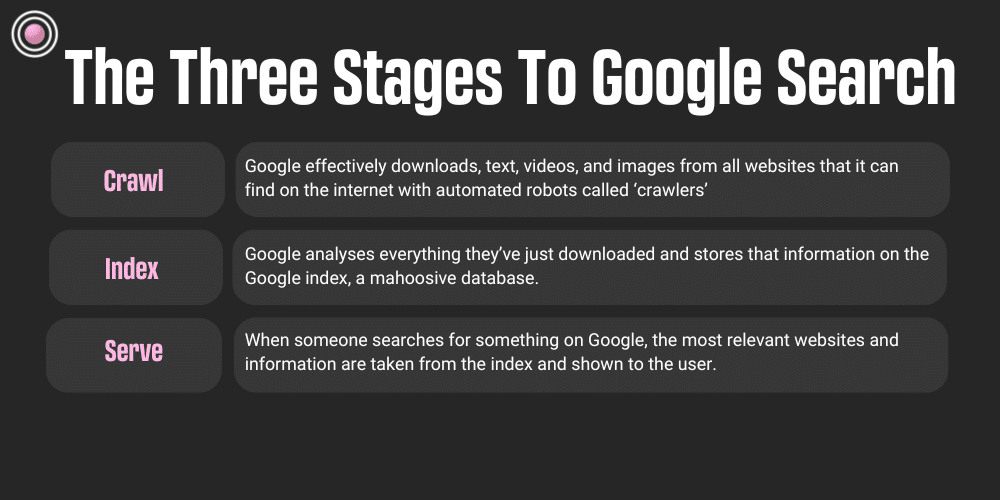
-
Joshua Lee
- 6 Min Read
- Blog, Content Creation
How Does Google Rank Content in 2024?
We’ll be the first to admit how confusing, annoying and confounding it can feel when trying to rank content on Google. And with the search giant processing 5.9 million searches every minute, you can add ‘difficult’ to the aforementioned list of frustrations.
The challenge is further exacerbated by so-called gurus and experts sharing some of the worst SEO advice, seemingly backed by opinion and no real hard evidence. So whether you’re here to get the full scoop or just as a refresher, join us as we answer the question, ‘how does google rank content in 2024?’.
Google Search Summarised
If you want the full scoop on Google Search, we’re gonna stop right there and direct you straight to the Google Search Essentials. This is about as extensive as it gets; pretty much everything you need to know about Google Search is in that document.
If you’re Gen Z and have an attention span like a goldfish, though, Google Search is another term for the search engine that used to be more popular than TikTok. It provides you with relevant websites and rich results to help satisfy user intent and the request for information, whether that be burning questions, frantic shopping, or answers to help you pass those tricky online certifications.
There are three stages to Google search:
- Crawl: Google effectively downloads, text, videos, and images from all websites that it can find on the internet with automated robots called ‘crawlers’
- Index: Google analyses everything they’ve just downloaded and stores that information on the Google index, a mahoosive database.
- Serve: When someone searches for something on Google, the most relevant websites and information are taken from the index and shown to the user.
That’s pretty much Google Search in a nutshell, but again, and in the spirit of fairness, for the boring oldies who like long paragraphs, here’s the in-depth guide on how Google Search works. And for the zoomers, this one has pretty pictures and animations, and a dog.
Search Algorithms 101
So now you know how Google Search works, you’re one step closer to learning how Google ranks content online. The next step is to learn all about the Google search algorithm, to understand how those results are automatically generated.
As simply as possible, the search ranking algorithm is a complex mechanism that decides what information should be retrieved from their index and presented to a given search query. Search is the search engine that crawls, indexes and serves content, and the algorithm is what helps determine what you see. It sifts through billions of web pages and 100,000,000 gigabytes of content, all so you can find out when Kung Fu Panda 4 is coming out – which is March 29th in the UK, by the way.
And again, if you’re even still reading after I’ve blatantly insulted most generations and want to learn a bit more in-depth, pretty pictures here, long boring words here
For more super interesting search marketing-related posts, from helpful guides to informative content, why not sign up for SEMWave? ROAR’s dedicated newsletter, made exclusively for curious legends like you.
How Content is Ranked
There’s a popular phrase here at ROAR, ‘Content is King’, we’re big advocates of using a content strategy to bolster your SEO efforts and performance. Heck, our Director even invented an entirely unique content marketing service called the SEO Bomb® that is THE way to create, write and publish content with SEO in mind.
So, the search algorithm analyses the content they’ve saved in their index and supposedly considers over 200+ undisclosed ranking factors and signals with very clever machine learning and processing techniques. Ultimately, there can be only one, only one can take that coveted Google SERP position one.
Keeping Up With the Algorithms
Great, I hope by now you’ve managed to understand our basic explanation of the search engine and ranking algorithm. Now, here’s the annoying part: this ranking algorithm changes, a lot. Most changes are small, but there are bigger, more impactful updates like broad core algorithm updates or the helpful content update that fundamentally can change the landscape of SEO.
So, not only are we not 100% sure about the ranking factors the algorithm uses to rank content, but they also make regular changes. Just to keep us SEOs on our toes.
What We Know About Actual Ranking Factors
Google has never fully and will probably never disclose the exact deets of its ranking algorithm. The lovely people over at Google, however, have given some tasty little morsels and dropped a few hints as to what the actual ranking factors are. So, there you go, the biggest secret of SEO has just been unravelled; it’s been one long game of marco polo, over the course of many years, and no one truly knows the actual ranking factors and ranking signals.
However, during this rather bashful game of tag, many SEOs have listened to the guidance, tested and created their own lists of what they believe are the ranking factors. What we know about ranking factors is constantly changing with every new competitor, algorithm update or regulatory change for Google.
The most important thing is that you are adaptable to the changes and test it for yourself. There are, of course, exceptions to the rule based on actual guidance from Google and evidence from other SEOs. What do we know about actual ranking factors? Frighteningly little, but more than enough to be spectacular at what we do.
The Three Most ‘Important Google Ranking Factors’
Now, to directly contradict myself, let’s cover what we would consider to be the three most important ranking factors. In our time as an agency and in our own game of marco polo, we have landed on three of the most important, almost confirmed ranking factors. Let’s take a look!
#1 – Helpful Quality Content
When we refer to helpful quality content, this takes on many forms: blog posts, news articles, service pages, brochures etc, designed to help someone satisfy their search query.
This process of creating an SEO content strategy begins by understanding the user intent within a search, conducting keyword research around a topic and then writing content to match what your audience is looking for. The process ends when you have a piece of genuinely helpful, valuable content that has been optimised for a specific target keyword.
In other words, write high-quality content that people actually want to read, provide something useful or helpful for them and match it to an actual target keyword. Or let us do it for you 😉
ROAR Tip: Don’t get sucked in by the artificial intelligence robots who claim to be able to create helpful content. Google does not love wholly AI-Generated content, so by all means use it for some inspiration but do not just ask ChatGPT to write you a blog post and publish!
#2 – Link Building
Link building is simply the process of getting another website to link to yours. Its purpose is to boost the domain authority of your website, gain higher rankings and bring more organic traffic. It’s pretty cut and dry, this is a proven way to help you rank on Google.
There are many forms of link building:
- Purchasing external links like backlinks – Very risky, unsafe and Google no-likey
- Guest posts and outreach – Reaching out to other quality websites and requesting a guest post or responding to requests for expert opinions and contributions to articles on other sites
- Naturally – Write better content, fulfil the helpful content update and you will naturally gain more links – Google’s official preferred method.
So, purchasing external links like backlinks has never worked; always been a totally stupid move. Guest posts and outreach are incredibly popular forms of link building, so much so that PR and link building agencies have become very popular. Natural link building is becoming more and more rare. Not really gonna cut it in 2024.
#3 – Page Experience
Officially, this has been removed from Google’s ranking system page; however, it has since been confirmed by the search liaison team that ‘Google’s core ranking systems look to reward content that provides a good page experience.’
Essentially, your website has a great user experience, it needs to be fast, accessible, mobile-friendly and secure. If we look at the main signals for Page Experience, we can see where we should focus our efforts to help improve our website and get it ranking:
- Page Loading Speed
- Core Web Vitals
- HTTPS
- Mobile Friendliness
You can use Google Page Speed Insights and Lighthouse to help you diagnose your website and start to help your content rank better.
And that’s essentially everything you need to know to understand how Google ranks content in 2024. You’ve been you, and I’ve been Joshua from ROAR; thank you for reading this post.
Key Takeaways
- Google Search involves three stages: crawling, indexing and serving. Understanding this process is essential to grasping how content is ranked.
- Search algorithms are complex, they determine what information is served and presented to a user for their given query.
- To rank highly, the key is to create helpful and high-quality content, don’t use chat GPT for goodness sake; write the damn thing yourself.
- The ranking algorithm changes a lot and so too do the ‘ranking factors’, so stay on your toes and keep up to date.
- While Google does not openly disclose their ranking signals or factors, helpful content, link building and page experience are considered to be crucial. Prioritise these factors to improve your chance of ranking content in 2024.
Ready to take your online presence to the next level? Let us optimise your website with our expert Content Writing and Optimisation Services. Get in touch now!







